Teenagers have rebelled against anti-vaxxers following No10’s expansion of the roll-out to include all 16- and 17-year-olds, with youngsters demanding adults stay out of the fierce debate.
Some concerned parents took to social media last night under the ‘LeaveOurKidsAlone’ hashtag to slam the Government’s move — which will mean children get to decide for themselves whether or not they get jabbed.
But many youngsters quickly hijacked the argument, telling adults to take their own advice and let teens make up their own mind.
The youths were ‘enraged’ by demands they stay unvaccinated, with critics of No10’s decision resorting to scare-mongering to dissuade youngsters.
Teenagers argued they wanted to get inoculated to help protect their grandparents.
And teachers weighed in to support their students, telling ‘anti-vaxxing morons’ they have no right to deny anyone a vaccine.
Health chiefs yesterday unveiled the updated guidance on vaccinating children, in a dramatic U-turn on advice given just two weeks before.
England’s deputy chief medical officer, Professor Jonathan Van-Tam, said parental consent will not be needed for the jabs, which will be rolled out before children go back to school in September.
And he strongly hinted the programme could be extended to those aged 12 to 15, with No10’s expert panel dedicated to reviewing ’emerging data’.
Safety concerns centre around a rare heart condition called myocarditis, which is up to seven times more common after second doses.
The Joint Committee for Vaccination and Immunisation (JCVI) — which advises No10 on vaccine policy — has not yet committed to making concrete plans to give teens top-up jabs.
But top scientists questioned what took the expert panel so long, saying the delayed decision means children won’t have time to have get doses before term-time.
Health officials have left it open as to whether boys — who have a higher chance of developing the complication — will be given different advice.
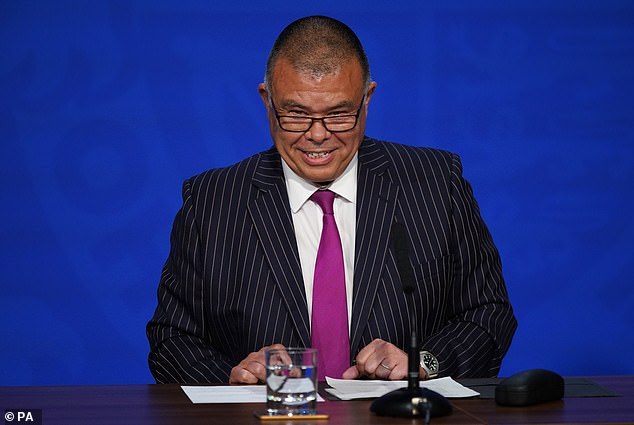
Pictured: Professor Jonathan Van-Tam, Deputy Chief Medical Officer for England, during a coronavirus media briefing in Downing Street on August 4, 2021
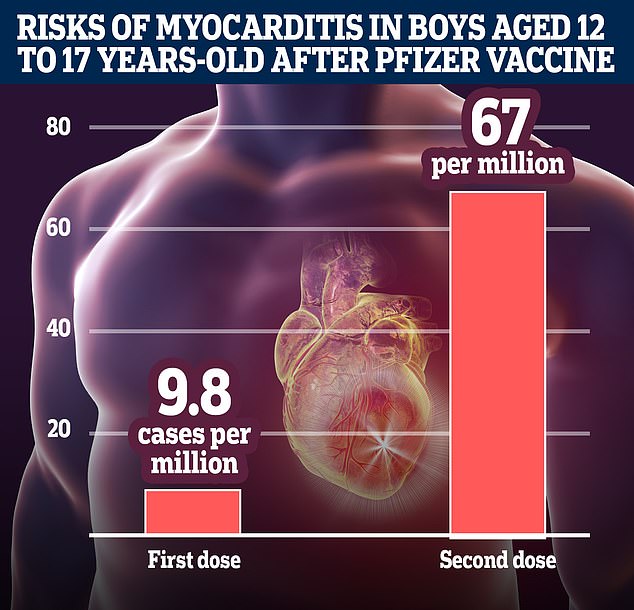
The Joint Committee for Vaccination and Immunisation (JCVI) — which advises No10 on vaccine policy — has not yet committed to making concrete plans to give teens top-up jabs. Health officials have left it open as to whether boys — who have a higher chance of developing the complication — will be given different advice
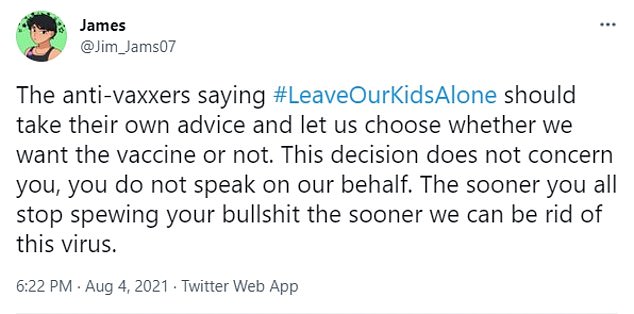
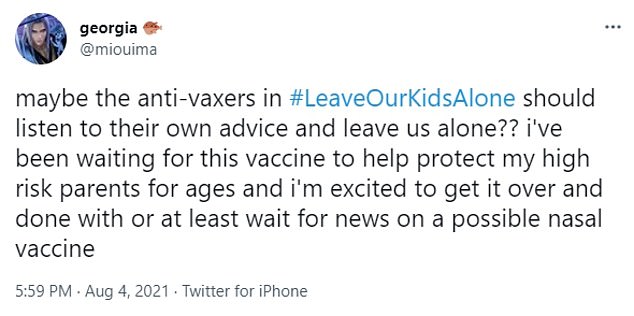
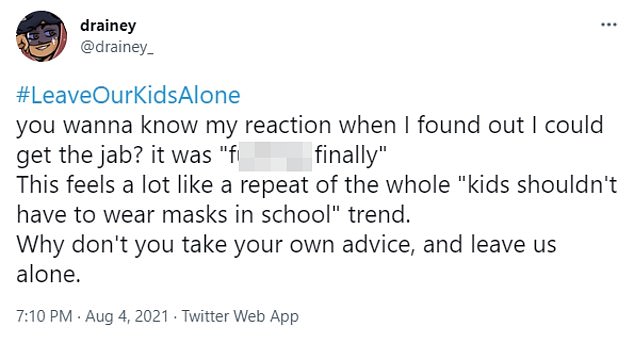
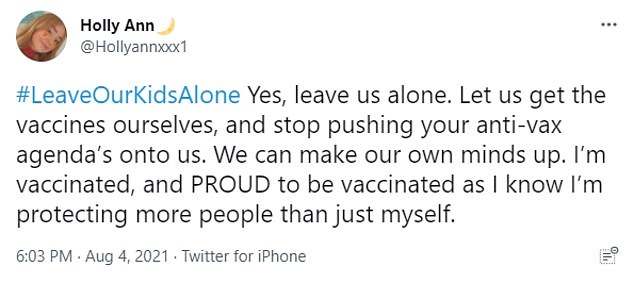
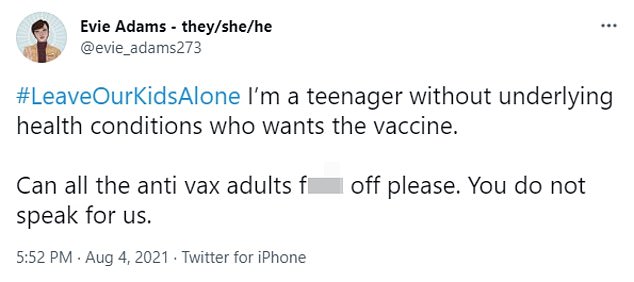
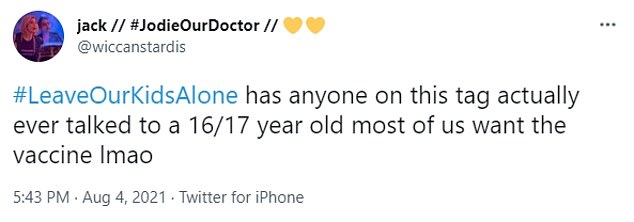
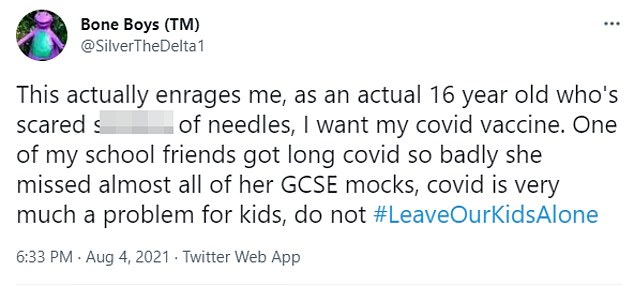
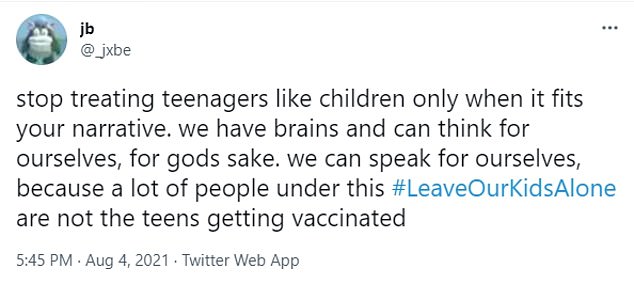
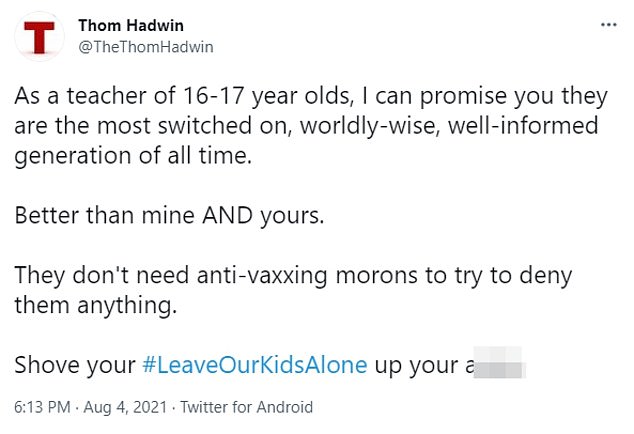
‘I’m definitely getting the jab – not like my naïve mum and dad’: 16 and 17-year-olds say they WILL get the Covid vaccine
Sixteen and 17-year-olds have insisted that they will get the Covid vaccination when they become eligible, regardless of their parents’ opinions.
It has been revealed that teenagers won’t need parental consent to get Covid vaccines, while No10’s top scientists have hinted children as young as 12 could be offered jabs later this year.
And 16- and 17-year-olds in Manchester have said that they plan to get the Covid vaccine as soon as they are eligible – even if their parents do not agree with them.
One 16-year-old said he is planning to get the Covid jab so he won’t have to ‘worry’ about getting the virus, and criticised his ‘naïve’ parents for choosing not to get vaccinated.

Clayton Murdock, 16, slammed his parents for being ‘naïve’ in not getting vaccinated themselves, but insisted that will not stop him from getting the Covid jab
Meanwhile, another teenager said he would get the Covid vaccine so he can go to gigs next year, while one 17-year-old said she was hoping to bag a ‘free kebab’ for getting vaccinated.
But some teens have remained sceptical about the vaccine after the announcement, with one woman saying she has heard of women suffering from bad periods after the jab, while another teen said he would only get the vaccine if he is ‘forced’ to.
The Joint Committee on Vaccination and Immunisation (JCVI) recommended the 1.4million youngsters should be offered Pfizer jabs, marking a U-turn on guidance the same panel issued two weeks ago.
Health Secretary Sajid Javid said the NHS would dish out invites for vaccines ‘as soon as possible’, with the goal of getting the oldest teenagers protected before they return to classrooms in September.
Advertisement
Immediately after the announcement, some parents took to social media to tell the Government to leave their ‘kids alone’.
But writing on Twitter, one teenager said: ‘Yes, leave us alone. Let us get the vaccines ourselves, and stop pushing your anti-vax agenda’s onto us.
‘We can make our own minds up. I’m vaccinated and proud to be vaccinated as I know I’m protecting more people than just myself.’
Another wrote: ‘Maybe the anti-vaxxers in #LeaveOurKidsAlone should listen to their own advice and leave us alone??
‘I’ve been waiting for this vaccine to help protect my high risk parents for ages and I’m excited to get it over and done with or at least wait for news on a possible nasal vaccine.’
And another said: ‘This actually enrages me. As an actual 16-year-old who’s scared s***less of needles, I want my Covid vaccine.
‘One of my school friends got long Covid so badly she missed almost all of her GCSE mocks.
‘Covid is very much a problem for kids, do #LeaveOurKidsAlone.’
Teacher’s came to their students’ side, with one writing: ‘As a teacher of 16-17 year olds, I can promise you they are the most switched on, worldy-wise, well-informed generation of all time.
‘Better than mine and yours. They don’t need anti-vaxxing morons to try to deny them anything.
‘Shove your #LeaveOurKidsAlone up your arses.’
At a Downing Street briefing, Professor Van Tam said there was ‘no time to waste’ in starting the rollout to 1.5million 16 and 17-year-olds.
‘Children are going to start going back to colleges and sixth-forms from September, and in Scotland that will be slightly earlier, so there is no time to waste in getting on with this,’ he said.
‘Now we have the Joint Committee on Vaccination and Immunisation (JCVI) advice on starting that initial first dose in 16 and 17-year-olds, then I want us to proceed as fast as is practically possible.’
Although he said this rollout was unlikely to start next week, it is set to commence very soon, with the jab initially delivered via existing vaccine clinics, GP surgeries and pharmacies.
The rollout could later be expanded and delivered at secondary schools.
Although the NHS is soon to embark on a booster programme for some more elderly and vulnerable people, Professor Van-Tam insisted there was a ‘plentiful’ supply of vaccine.
He added: ‘The NHS has been preparing for multiple options for very many weeks now and I would expect this programme will start in a very short number of weeks.’
The JCVI’s decision to recommend the jabs for 16 and 17-year-olds came less than three weeks after it stated that only under-18s with learning disabilities or chronic health conditions should be eligible for a vaccine.
That had followed concern over a rare side effect called myocarditis, a type of heart inflammation.
Now however, the committee believes it has ‘more certainty’ that the benefits of the vaccine outweigh the risks and that serious side effects are rare and mainly come after a second dose.
But the side effects are more common in boys than girls, according to data, and the JCVI have left it open as to whether different advice on second doses will be given to male teenagers.
Professor Adam Finn, a member of the JCVI and a paediatrician at the University of Bristol, said separate advice for boys was ‘theoretically on the cards’.
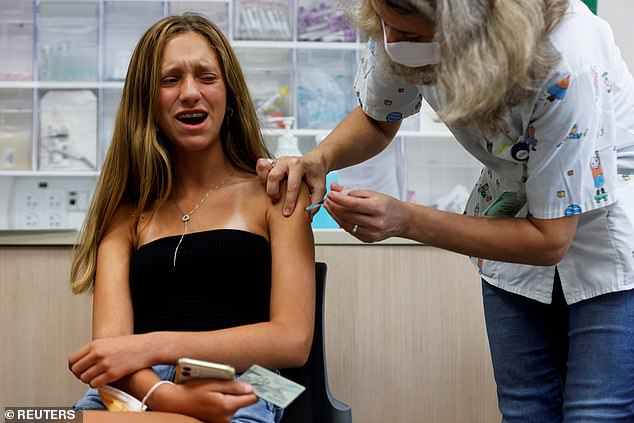
Pictured: A teenager reacts while receiving a dose of a vaccine against the coronavirus disease (COVID-19) at a Clalit healthcare maintenance organisation in Tel Aviv, Israel June 21, 2021
School segregation fears
By Eleanor Harding, Education Editor for the Daily Mail
Pupils who refuse the Covid vaccine must not be treated differently, families have urged.
Parent campaigners UsforThem fear unvaccinated children could be split into different groups and separated from their friends as schools try to control the virus.
Some schools previously made pupils sit apart and banned them from PE if they refused to wear a mask, the group says. They fear another a two-tier system over vaccines, adding: ‘It’s not hard to imagine where this could lead.’
However head teachers’ union ASCL stressed last night that all pupils will be treated the same, as schools will not know which ones have been vaccinated. It is understood the Government will also insist unvaccinated pupils are not treated unfavourably. Molly Kingsley, co-founder of UsforThem, said: ‘While vaccination of children will in theory be voluntary, a number of measures rolled out over the last year have been voluntary in name only. We’re already seeing widespread peer pressure being applied to young people to take the vaccine.’
In France, where the vaccine is approved for those aged 12 and over, unjabbed children are already being treated unfavourably, she said. Last week a French minister said pupils who are not vaccinated will be sent home in the event of a Covid outbreak, while inoculated ones will be allowed to stay.
Advertisement
He said it was clear myocarditis was primarily a ‘second dose risk’, with the risk in boys around six per million first doses given out compared to 67 per million second doses.
Universities minister Michelle Donelan yesterday denied the Government had piled pressure on the JCVI to reverse its policy. Downing Street also insisted it had not leant on the panel.
But, in private, ministers have made little secret of their frustration, especially because authorities in the US, France and Germany have started jabbing children.
The 16 and 17-year-olds will initially be given Pfizer jabs because Moderna has not yet been approved for them.
Boris Johnson encouraged families to listen to the JCVI’s advice, saying: ‘They are extremely expert there, they’re among the best, if not the best, in the world, they know what’s safe and I think we should listen to them and take our lead from them.’
Health Secretary Sajid Javid added: ‘The JCVI will continue to review data and provide updates on at-risk groups aged 12 to 15 and whether any additional groups will be added.’
He later confirmed the rollout for those aged 16 and 17 could take place via schools. ‘It will be this month and so the way we’re going to roll this out, I think as people will expect, is working through the clinicians, working through GPs, through the primary care networks,’ he said.
‘Also, we will use hospital hubs, we will use hubs like the one in Bournemouth I visited today – that I was very impressed by. And also we’ll be working through the already existing schools vaccination programme, which I think will help to bolster this.’
But some scientists questioned why the JCVI was not including 12 to 15-year-olds.
Children over 12 are eligible for the jab only if they have severe underlying health conditions or live with a vulnerable relative.
Peter Openshaw, a professor at Imperial College London and a government adviser, said: ‘Vaccination of teenagers may have a major effect on the return of Covid next winter, assuming that the rates will drop this summer.
‘Full vaccination takes time, so the sooner we start the sooner this age group will be protected.’
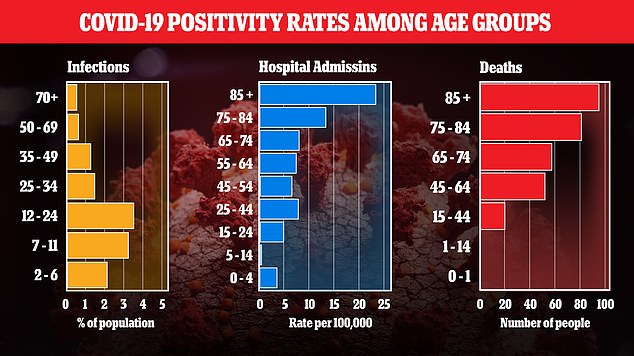
Much-needed, but this may be too little too late, say scientists
By Eleanor Hayward, Health Correspondent for the Daily Mail
Scientists have called for vaccines to be available to younger children immediately – claiming the decision to jab over-16s is ‘too little, too late’.
The group of 18 healthcare experts have written a paper stating the UK is now a ‘global outlier’ because it is not immunising 12 to 15-year-olds. They claim the jab’s benefits ‘clearly outweigh the risks’ in younger children.
The scientists said there have so far been no deaths or serious adverse effects in the nine million under-18s vaccinated around the world.
The paper, which is under review at The Lancet medical journal, added that the position of the Government’s vaccines advisory committee ‘contrasts with the policies of many other countries, including the US, Canada, Israel and much of Europe and south-east Asia, all of whom are currently vaccinating 12 to 17-year-olds’.
They criticised the JCVI’s ‘unacceptable delay’ in approving vaccines for over-16s, warning it means it will not be possible to fully vaccinate older teenagers before schools reopen.
Lead author Professor Christina Pagel, of University College London, said: ‘An opportunity to fully vaccinate students before the start of the next school term has been missed. This same decision even a month earlier would have allowed this.’
Advertisement
Dr PAUL McKAY: I understand parents’ concerns over Covid jab, but vaccinating is the right thing to do
Commentary By Professor Paul McKay
Any parent can be forgiven for feeling perplexed, if not alarmed, by the rapid reversal of the Government’s position on Covid vaccination in the under-18s.
Less than three weeks ago, the Joint Committee on Vaccination and Immunisation (JCVI) ruled out the ‘routine use of universal vaccination of children’ as data suggested the benefits did not outweigh the risks for youngsters.
Yesterday we learned the jab is to be offered to 16 and 17-year-olds after all.
So what is going on and how worried should parents and their teenagers be about the claims and counter-claims on safety? Tens of millions of Britons are now double-jabbed – part of a coronavirus shield that protects us individually as well as those around us.

Pictured: Professor Wei Shen Lim, chair of the Joint Committee on Vaccination and Immunisation (JCVI), during a media briefing in Downing Street, London, on coronavirus (Covid-19). Picture date: Wednesday August 4, 2021
But vaccine availability has largely been limited to adults. That has set us apart from many other countries, including the US, Canada and France, which are routinely vaccinating all over-12s. That does not mean that we are lagging behind. On the contrary, assessing the benefits of vaccinating youngsters against any possible risks is an on-going process.
And now JCVI scientists have analysed further data on vaccine safety and also taken into consideration the impact of the pandemic on school closures.
They are confident that the jab is safe for teenagers and so issued new recommendations.
This is good news. New infections are still flourishing – and largely in younger age groups – fuelled by the emergence of the more transmissible Delta variant. Some people think this doesn’t matter, given that many youngsters appear to be largely asymptomatic and very few suffer long-term effects.
But it matters a great deal because they can still infect others – especially vulnerable individuals, including those who cannot have the vaccine.
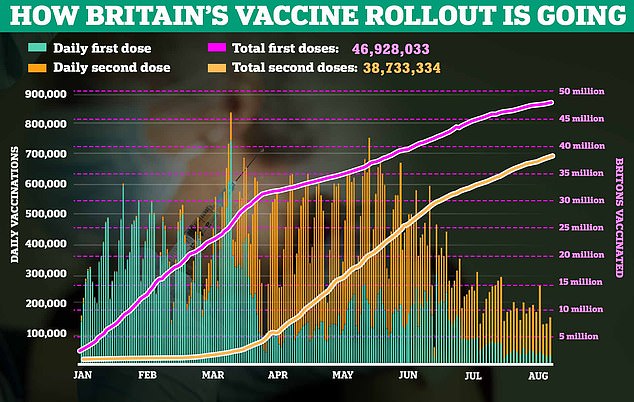
It will also matter a great deal come autumn when schools return. A surge in cases could have serious consequences for the education of our youngsters and wider society.
I understand this decision has been greeted with caution by some parents who worry about potential longer-term consequences. And there is, I know, particular concern about fertility in the wake of reports of menstrual irregularities linked to the vaccine.
Parents – and teenagers – are right to ask questions and they deserve honest answers. But too much of this debate is being played out in the lawless world of social media – often in a post from an anonymous ‘doctor’ or ‘my friend who is a nurse’ or someone from the ‘anti-vax’ movement.
Such accounts have assiduously and shamelessly fed lies and misinformation to the public from the start of the pandemic. This sort of content, steeped as it is in conspiracy and paranoid thinking, can prove more exciting than the dry pronouncements of boring old experts – and it is being lapped up by the young.
Well, I do hope young people and their parents will listen to this boring old scientist when I tell them that all the evidence shows that Covid vaccines are every bit as safe for the young as they have proved in the elderly who were first in the queue many months ago.
And as for fertility concerns, anecdotes and hearsay are no match for clear and rigorous evidence – and our evidence is that the vaccine has no effect whatsoever on the male and female reproductive systems.
What we do know is that the Covid virus can spread to the reproductive organs – it has been found in testicles and ovaries. In other words, any young person who is concerned about their future fertility should, in my view, have the vaccine. Getting jabbed is the right thing to do to protect yourself and others.
Dr McKay is a senior vaccine research scientist at Imperial College London.
What Covid vaccine will 16 and 17 year olds get? Will they get jabs in school? All your questions answered about the Government’s plan to inoculate 1.5million teenagers
Health chiefs have recommend all 16 and 17-year-olds get jabs, marking a dramatic U-turn.
Just two weeks ago the same expert panel — the Joint Committee on Vaccination and Immunisation (JCVI) — advised against doing so.
Health Secretary Sajid Javid accepted the advice and asked the NHS to prepare to vaccinate the group ‘as soon as possible’.
Officials said there is ‘no time to waste’ and want to give all 1.4million older teens the Pfizer vaccine before schools return in September. Detailed plans will be set out this week.
At a Downing Street press conference this afternoon, JCVI chair Professor Wei Shen Lim revealed 16-17 year olds won’t be booked in for second doses just yet, with the panel wanting to wait for more safety data.
The major safety concern around vaccinating children centres on a heart condition called myocarditis, which is six times more common after the top-up jab.
Health chiefs confirmed that children will be able to overrule their parents and opt to get the vaccine without their permission.
But experts are divided over the hugely controversial topic of vaccinating children, given their tiny risk of dying or falling seriously ill.
Some countries — including the US and Israel — have already started, which made Britain an outlier in so far only vaccinating the most at-risk over-12s.
As plans to vaccinate children in the are due to be unveiled by No10’s scientists, MailOnline answers your questions about the roll-out to youngsters.

The Government has not yet given a timeline on when 16 and 17-year-olds can start coming forward for jabs. But even if the roll-out out to older teenagers begin straight away, there will only be time to give them one dose by the time the school year begins on September 6
When will children be vaccinated?
Those aged 16 and 17 will be offered the jab within weeks, Professor Jonathan Van-Tam, England’s deputy chief medical officer, said today.
At a Downing Street press conference, he said: ‘I want us to proceed as quickly as practically possible.
‘That isn’t going to be tomorrow. I don’t think its likely to be early next week.
‘But I can tell you the NHS has been kept informed of what’s been deliberated and it has been preparing for multiple permutations and options for weeks.’
Mr Javid confirmed 16 and 17-year-olds will be offered the jab this month.
How long will it be until they get their second dose?
The children will initially be given one dose of Pfizer’s vaccine to give them ‘some immediate protection from severe disease’.
But the committee is yet to decide when they will receive their second dose.
Regulators are waiting for more safety data before pressing ahead with plans to give them a top-up.
Data from the US suggests myocarditis, a rare heart condition linked to the jab, is occurring more frequently after second doses.
The JCVI is looking at the evidence on whether the top-up jab is best delivered at eight weeks, as with adults, or sooner or potentially later.
Professor Lim told the press conference: ‘We are expecting more data to accumulate in the coming weeks. And that means we can offer advice that is the most up to date and relevant.’
Even if the roll-out to older teenagers began straight away, there will only be time to give them one dose before the school year begins on September 6.
Will jabs be dished out in schools?
Jabs will be administered in schools, like how the HPV vaccine is rolled out for 12 and 13 year old boys and girls.
Speaking to reporters at a vaccination centre in Bournemouth, Mr Javid revealed GPs and hospital hubs will also dish out jabs to children.
He said: ‘The way we’re going to roll this out, I think as people will expect, is working through the clinicians, GPs, primary care networks. Also, we will use hospital hubs.’
‘And we’ll be working through the existing schools vaccination programme, which I think will help to bolster this.’
But Education Secretary Gavin Williamson is expected to push for them to continue to be given at GP surgeries and NHS hubs, sources claimed.
What vaccine will youngsters get?
The UK has so far only approved Pfizer’s coronavirus jab for use in children over 12.
Health chiefs today confirmed it would the US-made vaccine would be given to 16 and 17 year olds.
Moderna’s vaccine — which works in a similar way — has not been given the green light for youngsters yet.
AstraZeneca’s injection has been linked to rare blood clots, and health chiefs have already restricted its use to over 40s. Therefore, the British-made vaccine won’t be offered to children.

The UK has so far only approved Pfizer’s coronavirus jab for use in children over 12
Scientists are currently testing nasal spray forms of the Covid vaccine — a method already used to give out children’s flu jabs. But none of the candidates being studied have yet to make it out of trials.
Which countries have already began vaccinating children?
Until today, Britain was the ‘outlier’. Major European countries and the US are already giving vaccines to children.
A quarter of 12 to 15 year olds in the US have received two doses, while a third have received their first jab.
France, and Spain, Hungary have already starting giving the jab to over-12s, while 10 per cent of children are already vaccinated in Germany.
Meanwhile, Canada, Denmark, Austria, Italy, Lithuania, Estonia, Norway, Switzerland, are expected to start giving youngsters jabs soon.
Israel approved the jabs for over-12s in May and subsequently approved it for 5 to 11-year-olds.
Have the vaccines been trialled on children?
The companies that make the vaccines, as well as other scientists, have studied how safe they are among children.
Pfizer and Moderna found their jab poses little risk in over-12s and are now trialling the injection in under-11s.
Rigorous analysis also revealed the jabs were effective.
The JCVI said a trial of 1,000 12 to 15-year-olds who received the Pfizer jab found it to be effective and only cause short-term side effects like a fever.
University of Oxford scientists are testing the AstraZeneca jab on children aged six to 17.

Graph shows the proportion of people in each age group who had received one Covid jab (light blue) and who were fully immunised (dark blue)
Do children get ill with Covid?
Most children who get infected have no or mild symptoms.
Fewer than 30 under-18s have died of Covid in the UK since the pandemic began — which scientists say is the equivalent of around one in 500,000 who get infected.
And a major study last night revealed just one in 50 develop symptoms which persist for longer than eight weeks.
So, what are the benefits of vaccinating children?
Scientists claim vaccinating children will curb the spread of the virus, with younger adults known to have fuelled Britain’s third wave.
Rolling out jabs to children, advocates insist, minimise the numbers having to take days off school to self-isolate.
Others say it will be impossible to achieve any kind of population immunity without inoculating under-18s.
Building up immunity now, before children return to classrooms in the autumn, will help keep infections down.
This is because vaccinating children can cause ‘knock on benefits across the whole population’, Imperial College London researchers say.
So what are the potential risks?
Since the vaccine roll-out has been expanded to children around the world, there have been reports of rare heart conditions: myocarditis and pericarditis.
Myocarditis is the inflammation of the heart muscle, while pericarditis is when the protective layer around the heart gets inflamed.
Data from the US shows those aged 12-17 are at the most risk of developing the heart problem after a Covid jab, compared to other age groups.
In that group, 10 cases of myocarditis were reported per million first doses given. This rises to 67 per million after the second dose. Most people recovered quickly.
There are no specific causes of the conditions but they are usually triggered by a virus.
The British Heart Foundation says in some cases, myocarditis can affect the heart’s electrical system, stopping it from pumping properly. ‘This can cause an abnormal heart rhythm, known as an arrhythmia,’ it claims.
But British regulators insist the 250 cases seen among Pfizer recipients are ‘typically mild’. Affected patients recover ‘within a short time with standard treatment’.
What explains the sudden U-turn?
Ministers had urged the JCVI to keep reviewing its decision and were keen to expand the roll-out to children.
No major new evidence has emerged, but the committee said they now ‘have more certainty’ that the benefits of the vaccine outweigh the risks.
Crucially, they are reassured that the side-effect of heart inflammation is extremely rare. Data from the UK shows it affects just one in 100,000 people and most make a full recovery.
The situation has also changed because high vaccine uptake in adults mean the UK’s epidemic is increasingly concentrated in un-jabbed teenagers.
Will parents have to give consent for the jabs?
It has been one of the most controversial issues surrounding the roll-out, but health chiefs said today that parents will not be able to decide whether their child gets the vaccine.
Professor Lim said: ‘In the UK a person who is 16 years and above is deemed able to consent for themselves.
‘If they are competent and able to consent for themselves, then that consent holds.’
This means children will be able to overrule their own parents if they disagree.
Government sources had claimed last night that under-18s wanting the jab would have to provide proof of parental consent.
But hinting at the JCVI’s stance, universities minister Michelle Donelan would not confirm that would be the case when quizzed about the move this morning.
Will more young people be offered the vaccine?
As it stands, at-risk 12 to 15-year-olds are already eligible for the vaccine.
But health chiefs hinted that more people in this age group could be offered the jab in the future.
Children in that age group are already eligible if they have a severe neurodisability, Down’s syndrome, underlying conditions resulting in immunosuppression, profound or multiple learning disabilities, severe learning disabilities, or those who are on the learning disability register.
But Professor Van-Tam said: ‘We have asked the JCVI to continue to review that list on an ongoing basis and my sense is that it is more likely rather than less likely that that risk will broaden over time as data becomes available.’
The JCVI said they are reviewing the evidence and want to ‘go very carefully and very safely’ before recommending it to more children.
The jabs are not currently licenced for under-12s, so use in young children is not on the horizon.
Will children be incentivised to come forward?
It is not yet clear what, if any, incentives will be offered to older teens to encourage them to get vaccinated.
But with younger adults being offered discounts for takeaways and taxis, ministers may make offerings to 16 and 17-year-olds.
Asked whether teens could be offered cash to come forward, Ms Donelan refused to rule it out.
She said: ‘We look at a variety of mechanisms to encourage young people.
‘I think the biggest incentive is to protect their own health and protect the health of their friends and their loved ones and we are seeing young people come forward every day and get vaccinated.
‘But we will keep everything on the table and review all options for incentivising everybody to get the vaccine.’
If cash for jabs was offered, the Government would be following in the footstep of US President Joe Biden, who told states to offer $100 (£71) to newly vaccinated people to encourage more to come forward.
Source link : https://www.dailymail.co.uk/news/article-9863869/Teenage-rebellion-Covid-jabs-16-17-year-olds-Youngsters-spark-Twitter-storm.html











